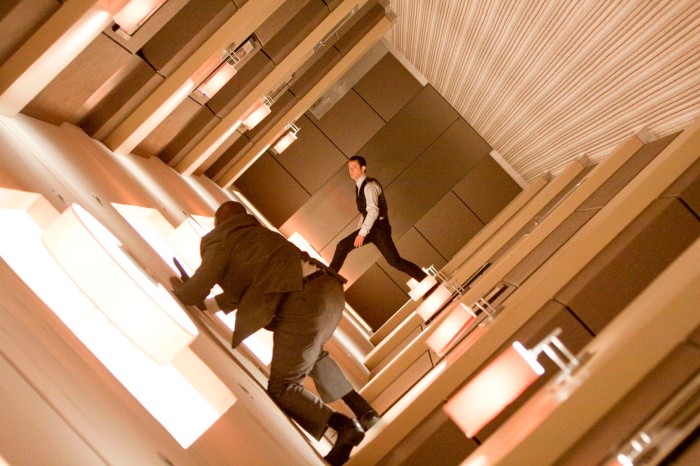It’s no big secret – at least to those who know me – that I’m a fan of writer-director Christopher Nolan‘s, and I’m certainly not alone. First making a splash way back in 2000 with the Best Original Screenplay-nominated Memento, Nolan is now known for a number of larger-scale blockbusters, including Inception, The Prestige, Interstellar, Dunkirk, and of course an excellent comic book trilogy comprised of Batman Begins, The Dark Knight, and The Dark Knight Rises. Disregarding the Caped Crusader for a moment, and bearing in mind the seeming premise of Nolan’s upcoming film Tenet (due out July 17, 2020), I want to talk for a bit about one of the common themes present in Nolan’s other films, as well as a construct that he seems well-matched to grapple with in the wide world of filmmaking: I’m of course talking about time. In the case of Tenet, Nolan appears to be concerning himself with the traversal, or perhaps the reversal of time, and while his existing filmography hasn’t exactly gone that far (okay, to an extent Memento has), it’s come about as close to that feat as possible in the way its stories are told.

This little maneuver’s gonna cost us 51 years!
Of course, in the case of Interstellar and Inception, we’re mostly talking about time dilation. Here, Nolan seems most concerned with challenging the dramatic question of how people deal with vast changes in the way time passes, either in the context of a dreamscape or in deep space. We’ve all had dreams that feel like they’re hours or even days long when in fact we’re only asleep for minutes, and we can all get a grip on the idea – perhaps with the help of a little exposition – that coming too close to a black hole can even cause years to pass in what only feels to the observer like hours. A lot of the drama present in these films, then, comes from how said observer manages to cope with the fact that the world as they know it – and the people in it – has passed them by (in the case of Cooper in Interstellar), or simply from how the observer maintains sanity and a grip on reality in a story world where time is supremely malleable (in the case of Cobb in Inception). In other words, it’s not just a cinematic party trick that allows the protagonist to be the same age as his children after only a few days, nor is it a means to an end for giving us a rotating hallway fight (OK, maybe it kind of is that, too) – it’s a story building block that ultimately gives us powerful scenes like this one that allow Matthew McConaughey the opportunity to display a surprising amount of acting prowess.

Me and my girlfriend finding creative ways to use our indoor space during quarantine.
The Prestige is a bit more subtle with its treatment of time, not making any attempts to alter the passage of time itself, but instead making it a player in the story, and an element that further heightens the surrounding mystery. Time jumps – most often accompanied by jumps in perspective or setting – don’t come with any kind of title cards, typically serving merely as a way to place the audience on less stable footing. Another Nolan trademark – beginning at the middle, or better yet the end – is also executed here as well as in Inception and of course in Memento, and doing so plants a narrative seed in the audience’s mind that can then be given ample time to grow (with the assistance of little things like characterization and plot) until it can be returned to in its fuller fleshed-out glory. While time isn’t exactly related to the theme of The Prestige – a theme that I suspect more involves the trials of revenge, the cost of greatness, and at its deepest roots, the definition of humanity – it’s certainly a tool that’s used effectively to embolden it. Out of all of the Nolan movies listed here, The Prestige is probably my favorite, and it’s the one I’d recommend from this de facto list if one is all you feel you can stomach.

Every magic trick consists of three parts.
Dunkirk takes the approach of splitting the film into three interleaved parts, each of which describes a critical part of the historical event: Land (which takes place over one week’s worth of time), Sea (one day), and Air (one hour). This approach allows Nolan the freedom to cut between these three often independent – but also occasionally interdependent – storylines to build intensity without feeling the need to hold the audience’s hand through various continuity details. With this method, too, the climax is more easily recognizable as the triumphant moment in which all of the timelines meet. Dunkirk is perhaps the least cerebral of all of Nolan’s movies, and certainly the least so of the ones I’ve mentioned here, and is instead more frenetic (much in the way that war itself is), so the use of time here is less as an implement of obstruction and more as an implement of tension-building. All the while, Hans Zimmer’s score makes us all the more aware of the importance of time in the literal use of Nolan’s pocketwatch as a percussive refrain. Indeed, I never would have guessed that there’d be a more on-the-nose embodiment of Nolan’s obsession with time in a soundtrack than in Inception‘s “Time,” and yet here we are.

Me in the toilet paper aisle of the grocery store.
This of course brings us to Memento, which pairs a complex narrative structure – one that alternates between chronological and nonlinear scenes – with a very singular treatment of the construct of memory. On paper, and without the employment of such a designing principle, Memento would be I think a very unremarkable neo-noir, but with this time-bending technique, it’s a cerebral thriller. Similar to The Prestige (which would come later), Nolan has more or less made time a character in the exercise that is this movie, and the effect of the unique traversal of time on what’s revealed about each character along the way – as well as the mountain of information kept from our amnesiac protagonist – is profound. While I suspect that the temporal elements of the movies I’ve discussed in the above paragraphs have been utilized elsewhere, I’m fairly confident that there’s no other movie out there that does the things with time that Memento does, and for that matter, I can’t remotely imagine the process by which it was written. Remember Sammy Jenkis!

Me showing someone a picture of my dog for the 27547th time.
With all of this taken into account, it makes perfect sense that a movie like Tenet – a movie I’m almost certainly going to see in theaters, by the way – is Nolan’s next big project, and at this point, it seems far more common that a Nolan movie treats time creatively than linearly. It’s only one way that Christopher Nolan is pushing the boundaries of filmmaking (another that comes to mind is stellar use of practical effects, but maybe that’s for another post), be it through a narrative structure that uses time uniquely or through actual alteration of time as a physical entity. I can’t claim to know what the root cause of Nolan’s fascination with time is, but what seems clear is that it’s unlikely to go away anytime soon, and that’s fine, because what comes out of it is typically a damn good movie or two.